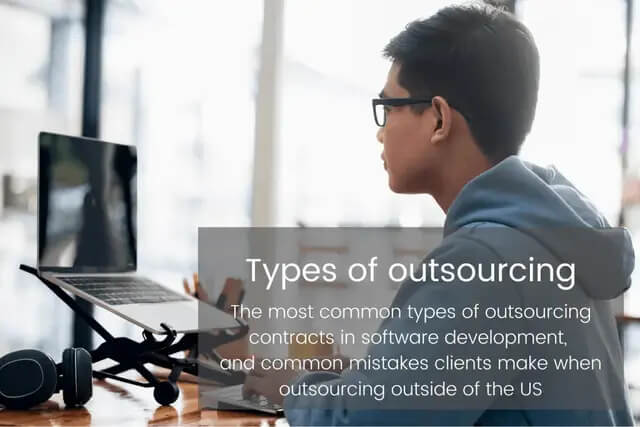

The most common types of outsourcing contracts in software development, and common mistakes clients make when outsourcing outside of the US

The global market for outsourced services hit $85.6 billion in 2018, and the numbers are expected to continue upwards in the coming years. Outsourcing, especially of IT services, continues to be popular to all types of businesses because it is an effective and efficient way to minimize costs, tap a global talent pool, and streamline business functions, without most of the hard work that comes with hiring and business expansions.
As Devs Data explains it, as with any software development work, business understanding comes first. Each development project will be different in many aspects, and the specific requirements for your project need to be properly laid out in the contract.
Projects vary in size and scopes; some will have clear requirements while others will require changes and updates. Some will need client control, while others will need minimal to none. Deliverables, projected timeline, and a detailed scope of the project are all essential to the success of outsourcing work. When possible, create a software requirements specification (SRS – read more here) document to make the work easier for everyone, especially for non-technical business executives and companies.
This helps you outline the essential project requirements that you want the outsourced team to know before they start. It also allows for collaboration as all parties can then add to it to build a common plan and a shared blueprint.
As you did when you were starting your search for the right partner vendor, think about the specific needs, goals, and future plans of your business. Take these into account throughout the whole search process.
Outsourcing contracts in software development are designed based on the different types of engagements, workflows, requirements, and client goals. Here is a quick rundown of the three most common types.

The most common contract types in software development include: Target Cost Contract, Time & Materials Contract and Fixed-Price Contract
There will always be changes or deviations to projects once it starts. These carry risks for both the vendor (who wants to be paid for any additional costs) and the customer (who wants to keep costs as low as possible). A target cost contract is a great way to handle this.
In a target cost contract, both parties negotiate a ‘target cost’ for the required service. If the provider is able to deliver under the targeted budget, both the provider and the customer get to split the savings, in what is known as a ‘gainshare’. Likewise, if the contractor goes over the budget, the additional expenses are shared, in what is known as a ‘painshare’.
This type of contract aims to share the risks and rewards of the outsourced development project between the two parties involved. This is ideal for software development or IT projects in which the scope is unknown and therefore cannot be given a fixed price.
This contract also makes vendors more willing to take on complex projects that may require several change requests since they will not shoulder the full risk of cost overruns. Clients, meanwhile, are more at ease that the project will be delivered on time and within budget (and not get stuck with a half-baked project because of disputes over expenses).
By contrast and in simple terms, a time & materials (T&M) contract is one where the client pays the provider for the man-hours and materials used. The time is paid for by taking into account the hourly rate of each team member involved in the outsourced project, while the materials can include software licenses and other related items.
This type of contract is ideal for when clients have a specific final objective in mind, such as to ‘create and launch X software’. It is a great option for short-term projects where the scope of work has yet to be defined in exact or step-by-step detail at its early stage.
Clients usually have to bear the risks of overruns in this setup, and they also have little control over time and budget projections. On the other hand, it is agile-oriented and does provide a lot of room for flexibility in development.
In this arrangement, the customer and vendor agree on a fixed price for the service. The provider usually gives their price based on defined project scopes, required man-hours, and deliverables.
What makes it different from a time & materials contract is that the vendor is not required to provide a breakdown of how the budget was spent. It depends on them where to allocate the said expenses to finish the project. The rates are what they are, as long as the agreed work is completed satisfactorily.
This setup is ideal for projects where the desired features and functions of the software are clearly and exhaustively defined. If there are cost overruns, the vendor will bear the extra expenses, which gives customers a low-cost risk.
| Contract type | Pros | Cons |
|---|---|---|
| Target Cost |
|
|
| Time and Materials |
|
|
| Fixed-Price |
|
|
Outsourcing is a solution to many business problems. Make sure to watch the video above to find out if it is suitable for your company.
Do you have IT recruitment needs?
As the saying goes, you need to read the fine print before finalizing any contract. This is so you ensure everything you need is properly listed, you are not missing anything, and you avoid loopholes.
When drafting a contract for an outsourced software development project, be sure to:

Avoiding mistakes is a key to success
Similarly, when you are outsourcing outside the US, there are some things you should check before sending the work to ensure the likelihood of success.
When you learn about different types of outsourcing, you will understand that a remote, outsourced team can improve the efficiency, and even the cash flow of your business, allowing you to scale up or down whenever you need to, without any huge changes in staff.
Your competitors who stick to in-house hiring will likely have a difficult time scaling; all the while, your development goes on uninterrupted.
When done correctly, outsourcing your software development needs can do wonders for your business operations. Just be sure to go over all the details and that the contract you are about to sign works for both you and the vendor you are partnering with.
Frequently asked questions (FAQ)
DevsData – your premium technology partner
DevsData is a boutique tech recruitment and software agency. Develop your software project with veteran engineers or scale up an in-house tech team of developers with relevant industry experience.
Free consultation with a software expert
🎧 Schedule a meeting
FEATURED IN


DevsData LLC is truly exceptional – their backend developers are some of the best I’ve ever worked with.”
Nicholas Johnson
Mentor at YC, serial entrepreneur


 Build your project with our veteran developers
Build your project with our veteran developers
 Explore the benefits of technology recruitment and tailor-made software
Explore the benefits of technology recruitment and tailor-made software
 Learn how to source skilled and experienced software developers
Learn how to source skilled and experienced software developers




Categories: Big data, data analytics | Software and technology | IT recruitment blog | IT in Poland | Content hub (blog)
